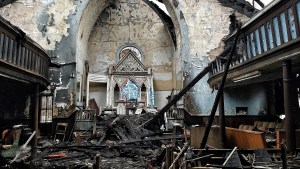The USCCB has stated its support for Joseph Kennedy, a high school football coach who was fired for praying on-field after games in 2015. The case, Kennedy v. Bremerton School District, will be heard by the U.S. Supreme Court in April.
Praying football
Kennedy coached football at Bremerton School District in Washington State from 2008 to 2015. During that time, he would take a moment at the end of each game to pray at the 50-yard line. According to Crux, Kennedy said he would always say a prayer of thanks for “player safety, sportsmanship and spirited competition.”
When he began this practice, the prayer was a quiet 30 seconds, but it slowly grew in scope. By 2015, Kennedy was giving motivational speeches that would draw in players, fans, and even the opposing teams. It was Kennedy’s tendency to add Christian messages to his speeches that eventually caused friction between the coach and the school.
The district soon informed Kennedy that while his speeches were welcome, they would have to remain secular in order to “avoid alienation of any team member.” Furthermore, the school district suggested that Kennedy pray in private, at which Kennedy took umbrage. He ultimately declined the offer and continued giving Christian-infused speeches until he was placed on leave in late 2015.
The arguments
Americans United for Separation of Church and State, which represents the Bremerton School District, suggests that some players felt pressured to join the crowd for the speeches. They argue that the speeches infringed upon the religious freedom of students by making them choose between their religion and being part of the team.
The Becket Fund for Religious Liberty, which represents Kennedy, however, disagrees with this assessment. In a March 2 press release, according to Catholic World Report, Becket’s Lori Windham clarified that there are no laws against public prayer:
“The Constitution exists to protect public expressions of faith, not to stop Americans from praying in public. The idea that high school football players can handle a tough game, but not the sight of someone kneeling in prayer at the end of the night, is ridiculous.”
Windham went on to note that an expression of faith is not an evangelical action. Becket will seek to prove that Kennedy was not establishing religious practice for the team, or trying to proselytize students.
When it goes before the Supreme Court, the case will answer two questions. The first is whether or not the First Amendment protects public-school employees’ ability to pray while on duty. The second is whether or not the public school has the duty to prohibit such prayer.
USCCB
The Bishops’ Conference filed a friend-of-the-court brief through Becket, a law firm that takes on cases where religious liberty may have been infringed. In the letter, the bishops wrote:
“Respect for diverse religious exercise, including religious exercise by public employees, is in the best of our national traditions and ought to be celebrated, not punished,” the brief reads.
The bishops questioned whether or not religious individuals would be able to work for the government at all. They noted that many Americans of various faiths, including government employees, pray throughout their work days. These individuals are not asked to stop their prayers, or remove religious emblems.
“Any such activities might make someone who encounters them feel discomfort, or provide the basis for a vague notion of government endorsement,” the brief adds. “But a proper Establishment Clause analysis, one based upon historical practices and understandings, does not lead to this result.”

